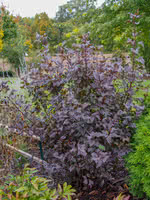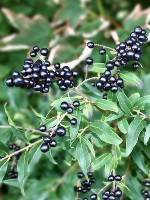Mon-Fri 9am - 5pm Mountain time
Diablo Ninebark vs Wild Privet
Physocarpus opulifolius Diablo
Ligustrum vulgare
NOT AVAILABLE THIS SEASON - MIGHT RETURN
Diablo Ninebark is a small, low maintenance, multi-stemmed shrub, that is used to add texture or color to any yard. This plant grows dark purple leaves in the spring and grows slightly faster than Common Ninebark. It features flaky red to brown bark, clusters of white flowers, and long, maple-like leaves. Diablo Ninebark can make a dense and colorful hedge, or it can be an attractive ornamental by itself.
Wild Privet is a fast growing ornamental shrub that is well suited for forming hedges and privacy screens. It will retain its leaves in warmer climates but drops them in colder areas. They have small white flowers, though the smell is often considered unpleasant. While the berries are inedible, they are a good food source for many bird species.
It is recommended to prune Wild Privet immediately after flowering, as it can readily self seed. It is deer and rabbit tolerant. It can grow in dry areas, on slopes, and withstand the wind making it well suited for many growing conditions.
Diablo Ninebark Quick Facts
Wild Privet Quick Facts
Toxicity: If ingested, all parts of this plant will cause severe discomfort. Toxic to dogs, cats, and horses

